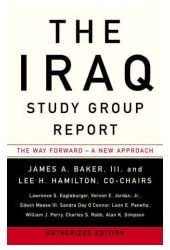
For you news junkies, policy nerds, political bloggers and people wondering what the Iraq Study Group’s recommendations for how to fix the Mess O’ Potamia are, the Iraq Study Group Report is now available. 142 pages, 79 recommendations, the difference between Sunnis and Shi’ites explained (and some people in Washington need to study up on that), and one president who’s likely to ignore it if it differs from the “things are going well” tack.
An excerpt:
Current U.S. policy is not working, as the level of violence in
Iraq is rising and the government is not advancing national reconciliation. Making no changes in policy would simply delay
the day of reckoning at a high cost. Nearly 100 Americans are
dying every month. The United States is spending $2 billion a
week. Our ability to respond to other international crises is
constrained. A majority of the American people are soured on
the war. This level of expense is not sustainable over an extended period, especially when progress is not being made.
The longer the United States remains in Iraq without progress,
the more resentment will grow among Iraqis who believe they
are subjects of a repressive American occupation. As one U.S.
official said to us, “Our leaving would make it worse….The
current approach without modification will not make it better.”
Here’s how you can get your paws on it:
Another excerpt:
The United States has made a massive commitment to the future of Iraq in both blood and treasure. As of December 2006,
nearly 2,900 Americans have lost their lives serving in Iraq. Another 21,000 Americans have been wounded, many severely.
To date, the United States has spent roughly $400 billion
on the Iraq War, and costs are running about $8 billion per
month. In addition, the United States must expect significant
“tail costs” to come. Caring for veterans and replacing lost
equipment will run into the hundreds of billions of dollars. Estimates run as high as $2 trillion for the final cost of the U.S. in-
volvement in Iraq.
Despite a massive effort, stability in Iraq remains elusive
and the situation is deteriorating. The Iraqi government cannot
now govern, sustain, and defend itself without the support of
the United States. Iraqis have not been convinced that they
must take responsibility for their own future. Iraq’s neighbors
and much of the international community have not been persuaded to play an active and constructive role in supporting
Iraq. The ability of the United States to shape outcomes is diminishing. Time is running out.






